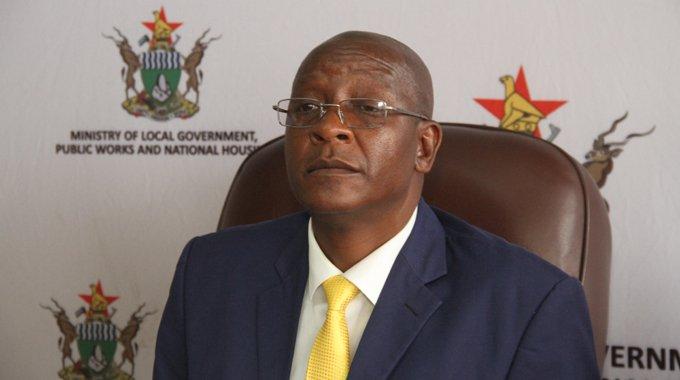News / National
'Ziyambi is talking garbage on Bulawayo water crisis'
09 Sep 2024 at 07:19hrs |
0 Views

Bulawayo residents have criticized the government’s stance on the city's water crisis, following comments from Justice, Legal and Parliamentary Affairs Minister Ziyambi Ziyambi, who attributed the shortage to mismanagement rather than a need for national intervention.
Minister Ziyambi stated last week that the water crisis in Bulawayo, the country’s second-largest city, should not be declared a national disaster, citing mismanagement as the primary cause.
However, Bulawayo City Council revealed on Thursday that the city’s supply dams are now at just 29% capacity, exacerbating the urgency for government intervention and external funding to tackle the issue.
Stephen Nkomo, chairperson of the Bulawayo Progressive Residents Association, disputed the minister’s claims. "The issue of poor maintenance is different from having empty dams," Nkomo said.
"There is no water in the dams, and the pipes are ineffective. The minister should visit the dams before making such statements. Maintenance issues and low dam levels are not the same."
Political analyst Effie Ncube urged the government to reassess its position, suggesting that declaring a state of national disaster could unlock additional resources and expedite solutions to the water crisis.
"Adequate water supply would foster investment opportunities in Bulawayo, boosting the overall economy. A thriving Bulawayo is crucial for national economic progress," Ncube stated.
Bulawayo Mayor David Coltart echoed the need for immediate government intervention, emphasizing that without it, the situation could worsen.
"We urgently need the US$14 million promised by Minister Ncube to upgrade pipelines from Insiza and Mtshabezi," Coltart said. He also called for increased security measures to combat vandalism and gold panning at the dams, which he claimed exacerbates the water shortage.
Coltart also highlighted the need to replace stolen borehole pumps and address the damage caused by gold panners, who have diverted water flow from the dams.
"The situation requires immediate action from the police, military, and Environmental Management Agency to stop further degradation and ensure that our water supply is protected," he added.
Bulawayo Residents Charter chairperson Thamsanqa Ndlovu advocated for a neutral approach to addressing the crisis.
"We need to avoid dramatizing the situation and find a neutral platform through ward development committees to address the issue constructively," Ndlovu said.
He also urged the government to distinguish between the water crises in Bulawayo and Harare, emphasizing that each has unique challenges and solutions.
"The government needs to address our crisis separately and work directly with the council to find effective solutions," Ndlovu concluded.
Minister Ziyambi stated last week that the water crisis in Bulawayo, the country’s second-largest city, should not be declared a national disaster, citing mismanagement as the primary cause.
However, Bulawayo City Council revealed on Thursday that the city’s supply dams are now at just 29% capacity, exacerbating the urgency for government intervention and external funding to tackle the issue.
Stephen Nkomo, chairperson of the Bulawayo Progressive Residents Association, disputed the minister’s claims. "The issue of poor maintenance is different from having empty dams," Nkomo said.
"There is no water in the dams, and the pipes are ineffective. The minister should visit the dams before making such statements. Maintenance issues and low dam levels are not the same."
Political analyst Effie Ncube urged the government to reassess its position, suggesting that declaring a state of national disaster could unlock additional resources and expedite solutions to the water crisis.
"Adequate water supply would foster investment opportunities in Bulawayo, boosting the overall economy. A thriving Bulawayo is crucial for national economic progress," Ncube stated.
Bulawayo Mayor David Coltart echoed the need for immediate government intervention, emphasizing that without it, the situation could worsen.
"We urgently need the US$14 million promised by Minister Ncube to upgrade pipelines from Insiza and Mtshabezi," Coltart said. He also called for increased security measures to combat vandalism and gold panning at the dams, which he claimed exacerbates the water shortage.
Coltart also highlighted the need to replace stolen borehole pumps and address the damage caused by gold panners, who have diverted water flow from the dams.
"The situation requires immediate action from the police, military, and Environmental Management Agency to stop further degradation and ensure that our water supply is protected," he added.
Bulawayo Residents Charter chairperson Thamsanqa Ndlovu advocated for a neutral approach to addressing the crisis.
"We need to avoid dramatizing the situation and find a neutral platform through ward development committees to address the issue constructively," Ndlovu said.
He also urged the government to distinguish between the water crises in Bulawayo and Harare, emphasizing that each has unique challenges and solutions.
"The government needs to address our crisis separately and work directly with the council to find effective solutions," Ndlovu concluded.
Source - newsday
Join the discussion
Loading comments…































